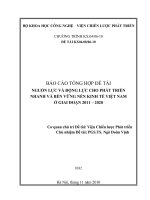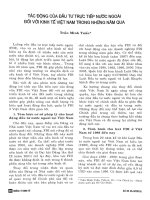Tác động của công nghệ thông tin và truyền thông đến kinh tế Việt Nam
Bạn đang xem bản rút gọn của tài liệu. Xem và tải ngay bản đầy đủ của tài liệu tại đây (836.09 KB, 15 trang )
�������������������������������������������������������������������������������������������������������������������������������������������������������������������������������������������������������������������������������������������������������������������������������������������������������������������������������������������������������������������������������������������������������������������������������������������������������������������������������������������������������������������������������������������������������������������������������������������������������������������������������������������������������������������������������������������������������������������������������������������������������������������������������������������������������������������������������������������������������������������������������������������������������������������������������������������������������������������������������������������������������������������������������������������������������������������������������������������������������������������������������������������������������������������������������������������������������������������������������������������������������������������������������������������������������������������������������������������������������������������������������������������������������������������������������������������������������������������������������������������������������������������������������������������������������������������������������������������������������������������������������������������������������������������������������������������������������������������������������������������������������������������������������������������������������������������������������������������������������������������������������������������������������������������������������������������������������������������������������������������������������������������������������������������������������������������������������������������������������������������������������������������������������������������������������������������������������������������������������������������������������������������������������������������������������������������������������������������������������������������������������������������������������������������������������������������������������������������������������������������������������������������������������������������������������������������������������������������������������������������������������������������������������������������������������������������������������������������������������������������������������������������������������������������������������������������������������������������������������������������������������������������������������������������������������������������������������������������������������������������������������������������������������������������������������������������������������������������������������������������������������������������������������������������������������������������������������������������������������������������������������������������������������������������������������������������������������������������������������������������������������������������������������������������������������������������������������������������������������������������������������������������������������������������������������������������������������������������������������������������������������������������������������������������������������������������������������������������������������������������������������������������������������������������������������������������������������������������������������������������������������������������������������������������������������������������������������������������������������������������������������������������������������������������������������������������������������������������������������������������������������������������������������������������������������������������������������������������������������������������������������������������������������������������������������������������������������������������������������������������������������������������������������������������������������������������������������������������������������������������������������������������������������������������������������������������������������������������������������������������������������������������������������������������������������������������������������������������������������������������������������������������������������������������������������������������������������������������������������������������������������������������������������������������������������������������������������������������������������������������������������������������������������������������������������������������������������������������������������������������������������������������������������������������������������������������������������������������������������������������������������������������������������������������������������������������������������������������������������������������������������������������������������������������������������������������������������������������������������������������������������������������������������������������������������������������������������������������������������������������������������������������������������������������������������������������������������������������������������������������������������������������������������������������������������������������������������������������������������������������������������������������������������������������������������������������������������������������������������������������������������������������������������������������������������������������������������������������������������������������������������������������������������������������������������������������������������������������������������������������������������������������������������������������������������������������������������������������������������������������������������������������������������������������������������������������������������������������������������������������������������������������������������������������������������������������������������������������������������������������������������������������������������������������������������������������������������������������������������������������������������������������������������������������������������������������������������������������������������������������������������������������������������������������������������������������������������������������������������������������������������������������������������������������������������������������������������������������������������������������������������������������������������������������������������������������������������������������������������������������������������������������������������������������������������������������������������������������������������������������������������������������������������������������������������������������������������������������������������������������������������������������������������������������������������������������������������������������������������������������������������������������������������������������������������������������������������������������������������������������������������������������������������������������������������������������������������������������������������������������������������������������������������������������������������������������������������������������������������������������������������������������������������������������������������������������������������������������������������������������������������������������������������������������������������������������������������������������������������������������������������������������������������������������������������������������������������������������������������������������������������������������������������������������������������������������������������������������������������������������������������������������������������������������������������������������������������������������������������������������������������������������������������������������������������������������������������������������������������������������������������������������������������������������������������������������������������������������������������������������������������������������������������������������������������������������������������������������������������������������������������������������������������������������������������������������������������������������������������������������������������������������������������������������������������������������������������������������������������������������������������������������������������������������������������������������������������������������������������������������������������������������������������������������������������������������������������������������������������������������������������������������������������������������������������������������������������������������������������������������������������������������������������������������������������������������������������������������������������������������������������������������������������������������������������������������������������������������������������������������������������������������������������������������������������������������������������������������������������������������������������������������������������������������������������������������������������������������������������������������������������������������������������������������������������������������������������������������������������������������������������������������������������������������������������������������������������������������������������������������������������������������������������������������������������������������������������������������������������������������������������������������������������������������������������������������������������������������������������������������������������������������������������������������������������������������������������������������������������������������������������������������������������������������������������������������������������������������������������������������������������������������������������������������������������������������������������������������������������������������������������������������������������������������������������������������������������������������������������������������������������������������������������������������������������������������������������������������������������������������������������������������������������������������������������������������������������������������������������������������������������������������������������������������������������������������������������������������������������������������������������������������������������������������������������������������������������������������������������������������������������������������������������������������������������������������������������������������������������������������������������������������������������������������������������������������������������������������������������������������������������������������������������������������������������������������������������������������������������������������������������������������������������������������������������������������������������������������������������������������������������������������������������������������������������������������������������������������������������������������������������������������������������������������������������������������������������������������������������������������������������������������������������������������������������������������������������������������������������������������������������������������������������������������������������������������������������������������������������������������������������������������������������������������������������������������������������������������������������������������������������������������������������������������������������������������������������������������������������������������������������������������������������������������������������������������������������������������������������������������������������������������������������������������������������������������������������������������������������������������������������������������������������������������������������������������������������������������������������������������������������������������������������������������������������������������������������������������������������������������������������������������������������������������������������������������������������������������������������������������������������������������������������������������������������������������������������������������������������������������������������������������������������������������������������������������������������������������������������������������������������������������������������������������������������������������������������������������������������������������������������������������������������������������������������������������������������������������������������������������������������������������������������������������������������������������������������������������������������������������������������������������������������������������������������������������������������������������������������������������������������������������������������������������������������������������������������������������������������������������������������������������������������������������������������������������������������������������������������������������������������������������������������������������������������������������������������������������������������������������������������������������������������������������������������������������������������������������������������������������������������������������������������������������������������������������������������������������������������������������������������������������������������������������������������������������������������������������������������������������������������������������������������������������������������������������������������������������������������������������������������������������������������������������������������������������������������������������������������������������������������������������������������������������������������������������������������������������������������������������������������������������������������������������������������������������������������������������������������������������������������������������������������������������������������������������������������������������������������������������������������������������������������������������������������������������������������������������������������������������������������������������������������������������������������������������������������������������������������������������������������������������������������������������������������������������������������������������������������������������������������������������������������������������������������������������������������������������������������������������������������������������������������������������������������������������������������������������������������������������������������������������������������������������������������������������������������������������������������������������������������������������������������������������������������������������������������������������������������������������������������������������������������������������������������������������������������������������������������������������������������������������������������������������������������������������������������������������������������������������������������������������������������������������������������������������������������������������������������������������������������������������������������������������������������������������������������������������������������������������������������������������������������������������������������������������������������������������������������������������������������������������������������������������������������������������������������������������������������������������������������������������������������������������������������������������������������������������������������������������������������������������������������������������������������������������������������������������������������������������������������������������������������������������������������������������������������������������������������������������������������������������������������������������������������������������������������������������������������������������������������������������������������������������������������������������������������������������������������������������������������������������������������������������������������������������������������������������������������������������������������������������������������������������������������������������������������������������������������������������������������������������������������������������������������������������������������������������������������������������������������������������������������������������������������������������������������������������������������������������������������������������������������������������������������������������������������������������������������������������������������������������������������������������������������������������������������������������������������������������������������������������������������������������������������������������������������������������������������������������������������������������������������������������������������������������������������������������������������������������������������������������������������������������������������������������������������������������������������������������������������������������������������������������������������������������������������������������������������������������������������������������������������������������������������������������������������������������������������������������������������������������������������������������������������������������������������������������������������������������������������������������������������������������������������������������������������������������������������������������������������������������������������������������������������������������������������������������������������������������������������������������������������������������������������������������������������������������������������������������������������������������������������������������������������������������������������������������������������������������������������������������������������������������������������������������������������������������������������������������������������������������������������������������������������������������������������������������������������������������������������������������������������������������������������������������������������������������������������������������������������������������������������������������������������������������������������������������������������������������������������������������������������������������������������������������������������������������������������������������������������������������������������������������������������������������������������������������������������������������������������������������������������������������������������������������������������������������������������������������������������������������������������������������������������������������������������������������������������������������������������������������������������������������������������������������������������������������������������������������������������������������������������������������������������������������������������������������������������������������������������������������������������������������������������������������������������������������������������������������������������������������������������������������������������������������������������������������������������������������������������������������������������������������������������������������������������������������������������������������������������������������������������������������������������������������������������������������������������������������������������������������������������������������������������������������������������������������������������������������������������������������������������������������������������������������������������������������������������������������������������������������������������������������������������������������������������������������������������������������������������������������������������������������������������������������������������������������������������������������������������������������������������������������������������������������������������������������������������������������������������������������������������������������������������������������������������������������������������������������������������������������������������������������������������������������������������������������������������������������������������������������������������������������������������������������������������������������������������������������������������������������������������������������������������������������������������������������������������������������������������������������������������������������������������������������������������������������������������������������������������������������������������������������������������������������������������������������������������������������������������������������������������������������������������������������������������������������������������������������������������������������������������������������������������������������������������������������������������������������������������������������������������������������������������������������������������������������������������������������������������������������������������������������������������������������������������������������������������������������������������������������������������������������������������������������������������������������������������������������������������������������������������������������������������������������������������������������������������������������������������������������������������������������������������������������������������������������������������������������������������������������������������������������������������������������������������������������������������������������������������������������������������������������������������������������������������������������������������������������������������������������������������������������������������������������������������������������������������������������������������������������������������������������������������������������������������������������������������������������������������������������������������������������������������������������������������������������������������������������������������������������������������������������������������������������������������������������������������������������������������������������������������������������������������������������������������������������������������������������������������������������������������������������������������������������������������������������������������������������������������������������������������������������������������������������������������������������������������������������������������������������������������������������������������������������������������������������������������������������������������������������������������������������������������������������������������������������������������������������������������������������������������������������������������������������������������������������������������������������������������������������������������������������������������������������������������������������������������������������������������������������������������������������������������������������������������������������������������������������������������������������������������������������������������������������������������������������������������������������������������������������������������������������������������������������������������������������������������������������������������������������������������������������������������������������������������������������������������������������������������������������������������������������������������������������������������������������������������������������������������������������������������������������������������������������������������������������������������������������������������������������������������������������������������������������������������������������������������������������������������������������������������������������������������������������������������������������������������������������������������������������������������������������������������������������������������������������������������������������������������������������������������������������������������������������������������������������������������������������������������������������������������������������������������������������������������������������������������������������������������������������������������������������������������������������������������������������������������������������������������������������������������������������������������������������������������������������������������������������������������������������������������������������������������������������������������������������������������������������������������������������������������������������������������������������������������������������������������������������������������������������������������������������������������������������������������������������������������������������������������������������������������������������������������������������������������������������������������������������������������������������������������������������������������������������������������������������������������������������������������������������������������������������������������������������������������������������������������������������������������������������������������������������������������������������������������������������������������������������������������������������������������������������������������������������������������������������������������������������������������������������������������������������������������������������������������������������������������������������������������������������������������������������������������������������������������������������������������������������������������������������������������������������������������������������������������������������������������������������������������������������������������������������������������������������������������������������������������������������������������������������������������������������������������������������������������������������������������������������������������������������������������������������������������������������������������������������������������������������������������������������������������������������������������������������������������������������������������������������������������������������������������������������������������������������������������������������������������������������������������������������������������������������������������������������������������������������������������������������������������������������������������������������������������������������������������������������������������������������������������������������������������������������������������������������������������������������������������������������������������������������������������������������������������������������������������������������������������������������������������������������������������������������������������������������������������������������������������������������������������������������������������������������������������������������������������������������������������������������������������������������������������������������������������������������������������������������������������������������������������������������������������������������������������������������������������������������������������������������������������������������������������������������������������������������������������������������������������������������������������������������������������������������������������������������������������������������������������������������������������������������������������������������������������������������������������������������������������������������������������������������������������������������������������������������������������������������������������������������������������������������������������������������������������������������������������������������������������������������������������������������������������������������������������������������������������������������������������������������������������������������������������������������������������������������������������������������������������������������������������������������������������������������������������������������������������������������������������������������������������������������������������������������������������������������������������������������������������������������������������������������������������������������������������������������������������������������������������������������������������������������������������������������������������������������������������������������������������������������������������������������������������������������������������������������������������������������������������������������������������������������������������������������������������������������������������������������������������������������������������������������������������������������������������������������������������������������������������������������������������������������������������������������������������������������������������������������������������������������������������������������������������������������������������������������������������������������������������������������������������������������������������������������������������������������������������������������������������������������������������������������������������������������������������������������������������������������������������������������������������������������������������������������������������������������������������������������������������������������������������������������������������������������������������������������������������������������������������������������������������������������������������������������������������������������������������������������������������������������������������������������������������������������������������������������������������������������������������������������������������������������������������������������������������������������������������������������������������������������������������������������������������������������������������������������������������������������������������������������������������������������������������������������������������������������������������������������������������������������������������������������������������������������������������������������������������������������������������������������������������������������������������������������������������������������������������������������������������������������������������������������������������������������������������������������������������������������������������������������������������������������������������������������������������������������������������������������������������������������������������������������������������������������������������������������������������������������������������������������������������������������������������������������������������������������������������������������������������������������������������������������������������������������������������������������������������������������������������������������������������������������������������������������������������������������������������������������������������������������������������������������������������������������������������������������������������������������������������������������������������������������������������������������������������������������������������������������������������������������������������������������������������������������������������������������������������������������������������������������������������������������������������������������������������������������������������������������������������������������������������������������������������������������������������������������������������������������������������������������������������������������������������������������������������������������������������������������������������������������������������������������������������������������������������������������������������������������������������������������������������������������������������������������������������������������������������������������������������������������������������������������������������������������������������������������������������������������������������������������������������������������������������������������������������������������������������������������������������������������������������������������������������������������������������������������������������������������������������������������������������������������������������������������������������������������������������������������������������������������������������������������������������������������������������������������������������������������������������������������������������������������������������������������������������������������������������������������������������������������������������������������������������������������������������������������������������������������������������������������������������������������������������������������������������������������������������������������������������������������������������������������������������������������������������������������������������������������������������������������������������������������������������������������������������������������������������������������������������������������������������������������������������������������������������������������������������������������������������������������������������������������������������������������������������������������������������������������������������������������������������������������������������������������������������������������������������������������������������������������������������������������������������������������������������������������������������������������������������������������������������������������������������������������������������������������������������������������������������������������������������������������������������������������������������������������������������������������������������������������������������������������������������������������������������������������������������������������������������������������������������������������������������������������������������������������������������������������������������������������������������������������������������������������������������������������������������������������������������������������������������������������������������������������������������������������������������������������������������������������������������������������������������������������������������������������������������������������������������������������������������������������������������������������������������������������������������������������������������������������������������������������������������������������������������������������������������������������������������������������������������������������������������������������������������������������������������������������������������������������������������������������������������������������������������������������������������������������������������������������������������������������������� gồm (1) tăng cường đầu tư vào công nghệ thông tin và truyền thông, (2) tăng cường tác
động lan tỏa từ việc ứng dụng công nghệ thông tin và truyền thông như là một yếu tố đầu vào
cho sản xuất và (3) tăng cường tính đổi mới trong kinh doanh thông qua áp dụng công nghệ
thông tin và truyền thơng.
Muốn vậy, về phía chính phủ, chính sách cơng nghệ thông tin và truyền thông cần trước
hết tạo đà và tạo mơi trường kích thích đầu tư vào cơng nghệ thông tin và truyền thông. Môi
trường đầu tư công nghệ thơng tin và truyền thơng có thể được kích thích từ phía cầu, thơng
qua các chương trình chẳng hạn như chính phủ điện tử, chương trình chuyển đổi số cho các
doanh nghiệp, tổ chức hoặc có thể được kích thích từ phía cung chẳng hạn các hỗ trợ cơ chế, tài
chính, xúc tiến thương mại đối với các doanh nghiệp cơng nghệ thơng tin và truyền thơng.
Chính phủ cũng cần kích thích nghiên cứu sáng tạo, ứng dụng và chấp nhận rủi ro khi phát
triển và ứng dụng những thành tựu mới của công nghệ thông tin và truyền thông. Trong
trường hợp này, các biện pháp có thể bao gồm thúc đẩy nghiên cứu ứng dụng và thúc đẩy các
doanh nghiệp cơng nghệ khởi nghiệp tại Việt Nam. Về phía doanh nghiệp, các doanh nghiệp
Việt Nam cần mạnh dạn ứng dụng công nghệ thông tin và truyền thông cho những thay đổi
16
jos.hueuni.edu.vn
Tập 128, Số 5D, 2019
mang tính bước ngoặt. Có như vậy, công nghệ thông tin và truyền thông mới phát huy được
tiềm năng cao, thúc đẩy nền kinh tế Việt Nam phát triển, theo kịp các quốc gia trên thế giới.
Mặc dù nghiên cứu đã xây dựng được bức tranh khá tổng thể đánh giá tác động kinh tế
của công nghệ thông tin và truyền thông tới nền kinh tế Việt Nam từ khía cạnh vĩ mơ tới vi mơ,
nhưng do kết quả nghiên cứu dựa trên trích xuất và tập hợp các nghiên cứu khác nhau với các
nguồn dữ liệu khác nhau nên việc phân tích kết quả sẽ có những hạn chế nhất định. Trong thời
gian tới, tác giả sẽ thực hiện nghiên cứu định lượng dựa trên một bộ dữ liệu chính thống, sử
dụng các phương pháp khác nhau để đánh giá các góc cạnh tác động của công nghệ thông tin
và truyền thông tới nền kinh tế Việt Nam.
Tài liệu tham khảo
1
APO (Asian Productivity Organization) (2018), APO Productivity Database 2018, Retrieved
from on 25 June 2019.
2
Berrio S. E. C., Redondo R. P., Hernandez H. G. (2018), Impact of ICT on the Generation of
New Services Companies, Contemporary Engineering Sciences, 11(52), 2591–2599.
3
Bresnahan T. F., Trajtenberg M. (1992), General Purpose Technologies: Engines of Growth?,
NBER Working Paper, 4148.
4
Brynjolfsson E., Kahin B. (2000), Understanding the Digital Economy: Data, Tools, and Research,
Massachusetts Institute of Technology, US.
5
Daveri F. (2000), Is growth an Information Technology story in Europe too?, IGIER Working
Paper, 168.
6
Dosi G. (1982), Technical Paradigms and Technological Trajectories, Research Policy, 11, 147–
162.
7
Đức Đ. T. V., Linh Đ. H. (2018), Contribution of ICT to Vietnamese Economy: An InputOutput Analysis, VNU Journal of Economic and Business, 33(5E), 1–17, Retrieved from
on 20 June 2019.
8
Freeman, C. (2005), The ICT Paradigm, in Mansell, R. et al. (ed.), The Oxford Handbook of
Information and Communication Technologies, U.S.: Oxford University Press.
9
Helpman E. (Eds.) (1998), General Purpose Technologies and Economic Growth, Cambridge,
MA: MIT Press.
10 Heshmati A., Yang W. (2006), Contribution of ICT to the Chinese Economic Growth, Ratio
Working Papers 91, The Ratio Institute.
11 Irawan T. (2013), ICT and Economic Development: Conclusion from IO Analysis for Selected
ASEAN Member States, University of Wuppertal.
17
Đặng Thị Việt Đức
Tập 128, Số 5D, 2019
12 Karlsson E., Lijivern J. (2017), ICT Investment and the Effect on Economic Growth- A
Comparative Study Across Four Income Groups, International School, Jonkping University.
13 Kegels C., Van Overbeke M., Van Zandweghe W (2002), ICT contribution to economic
performance in Belgium: Preliminary evidence, Working Paper 8–02, Federal Planning Bureau,
Brussels.
14 Niebel T. (2014), ICT and Economic Growth- Comparing Developing, Emerging and Developed
Countries, ZEW Centre for European Economic Research, Discussion Paper, 14–117.
15 Nurmilaakso, J. M. (2009), ICT solutions and labor productivity: evidence from firm-level
data, Electronic Commerce Research, 9(3), 173–181.
16 Perez C. (1983), Structural Change and Assimilation of New Technologies in the Economic
and Social Systems, Future, October (1983), 357–375.
17 Perez C. (2004), Technological Revolutions, Paradigm Shifts, and Socio-Institutional
Change, in: R. Erik (Eds.), Globalization, Economic Development and Inequality: An Alternative
Perspective, Cheltenham, UK, Northampton, MA, USA: Edward Elgar, 217–242.
18 Pilat D. (2004), The Economic Impacts of ICT- What have We Learned Thus Far?, Zew
Conference on the Economics of Information and Communication Technologies, Mannheim,
July
2–3.
19 Phước N. Đ. H, Bình Đ. T. (2018), The Impact of E-commerce on Vietnamese SMEs,
European Journal of Business Science and Technology, 3(2), 90–96.
20 Salwani, M. I., Marthandan, G., Norzaidi, M. D., Chong, S. C. (2009), E-commerce usage and
business performance in the Malaysian tourism sector: empirical analysis, Information
Management & Computer Security, 17(2), 166–185.
21 Shiller R. (2000), Irrational Exuberance, New York: Princeton University Press.
22 Schreyer P. (2000), The contribution of information and communication technology to output
growth: A study of the G7 countries, Retrieved from />23 WEF (World Economic Forum) (2017), Global Information Technology Report 2016.
18
jos.hueuni.edu.vn
Tập 128, Số 5D, 2019
IMPACT OF INFORMATION AND COMMUNICATION
TECHNOLOGY ON VIETNAM’S ECONOMY
Dang Thi Viet Duc*
Posts and Telecommunications Institute of Technology
122 Hoang Quoc Viet St., Cau Giay District, Ha Noi, Vietnam
Abstract. Information and communication technology (ICT) is considered as an important driving force
for socio-economic development. In Vietnam, Information and communication technology has been
invested for economic development for more than two decades, but there have been limited quantitative
assessments of the impact of ICT on the economy. This article systematizes the impact of ICT on Vietnam’s
economy at macro-economic, industry, and business levels. The results indicate that the contribution of
ICT to Vietnam’s economy is relatively positive. However, compared with other countries in the region,
Vietnam experiences a limited impact of ICT on GDP growth, labor productivity growth, ICT diffusion as
the technology input of production, as well as the impact of ICT to change the business model and
organizational model of the enterprise. On the basis of these results, the author provides implications for
businesses and policymakers to better exploit ICT for business and economic development in Vietnam.
Keywords: ICT, impact, Vietnam’s economy
19









